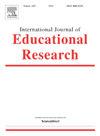Stereotyped perceptions of readers: an experimental vignette study with high school students and teachers
IF 2.5
3区 教育学
Q1 EDUCATION & EDUCATIONAL RESEARCH
引用次数: 0
Abstract
In many countries, there are medium to large gender gaps in reading achievement and motivation in favor of female students. Since research does not show substantive gender differences in verbal skills, socio-cognitive factors, such as stereotypes associated with reading, become a plausible explanation for these gender gaps. A vignette study was conducted to test whether high school students and teachers have stereotypical perceptions about boys and girls who like to read. The study used a 2 (target’s gender: boy vs. girl) x 2 (target’s reading enjoyment: low vs. high) factorial design to examine the effect of a character’s gender and reading enjoyment on participants’ judgments about the character’s academic traits, popularity, and gender expression. Participants were 296 high school students and 135 Chilean high school language-teachers in Santiago (Chile). Multivariate analysis of variance (MANOVA) and follow-up univariate ANOVAs with Bonferroni corrections showed that students hold gender stereotypes about reading because they perceive reading to be more associated with femininity than masculinity. Additionally, both students and teachers perceive characters who like to read as having more academic traits and being less popular than characters who do not enjoy reading. Contrary to expectations, no interaction effects between gender and reading enjoyment were found. These findings provide empirical evidence regarding a relevant topic in education -sources of inequalities in reading achievement. Such results may offer a preliminary basis for identifying general directions for policies or interventions that promote more equitable literacy learning opportunities for male and female high school students.
读者的刻板印象:对高中学生和教师的实验研究
在许多国家,女生在阅读成绩和阅读动机方面存在中等到较大的性别差距。由于研究没有显示语言技能的实质性性别差异,社会认知因素,如与阅读相关的刻板印象,成为这些性别差距的合理解释。进行了一项小插图研究,以测试高中学生和教师是否对喜欢阅读的男孩和女孩有刻板印象。该研究使用了2(目标性别:男孩vs女孩)× 2(目标阅读享受:低vs高)的因子设计来检验角色的性别和阅读享受对参与者对角色的学术特征、受欢迎程度和性别表达的判断的影响。研究对象为296名智利高中生和135名智利高中语言教师。多变量方差分析(MANOVA)和后续单变量方差分析(anova)经Bonferroni校正后显示,学生对阅读持有性别刻板印象,因为他们认为阅读与女性气质比男性气质更相关。此外,学生和老师都认为喜欢阅读的角色比不喜欢阅读的角色更有学术特征,更不受欢迎。与预期相反,性别与阅读享受之间没有交互作用。这些发现为教育中的一个相关话题——阅读成绩不平等的来源——提供了经验证据。这些结果可能为确定促进男女高中学生更公平的识字学习机会的政策或干预措施的总体方向提供初步基础。
本文章由计算机程序翻译,如有差异,请以英文原文为准。
求助全文
约1分钟内获得全文
求助全文
来源期刊

International Journal of Educational Research
EDUCATION & EDUCATIONAL RESEARCH-
CiteScore
6.20
自引率
3.10%
发文量
141
审稿时长
21 days
期刊介绍:
The International Journal of Educational Research publishes regular papers and special issues on specific topics of interest to international audiences of educational researchers. Examples of recent Special Issues published in the journal illustrate the breadth of topics that have be included in the journal: Students Perspectives on Learning Environments, Social, Motivational and Emotional Aspects of Learning Disabilities, Epistemological Beliefs and Domain, Analyzing Mathematics Classroom Cultures and Practices, and Music Education: A site for collaborative creativity.
 求助内容:
求助内容: 应助结果提醒方式:
应助结果提醒方式:


